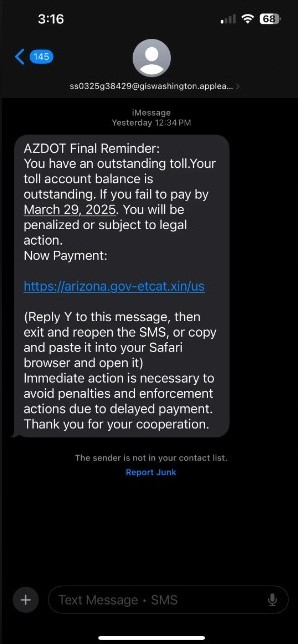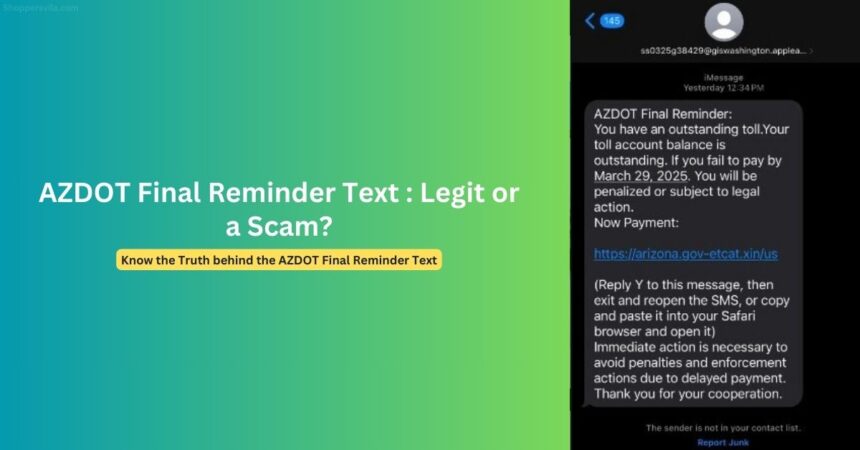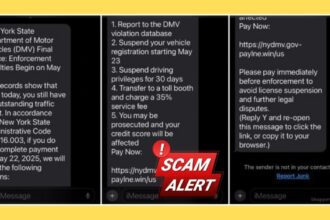In recent weeks, thousands of Arizona residents have been bombarded with alarming text messages claiming they owe money for unpaid tolls. The messages, which appear to be from the Arizona Department of Transportation (ADOT), threaten legal action if recipients don’t pay immediately. There’s just one glaring problem: Arizona doesn’t have toll roads.
This sophisticated “smishing” campaign has prompted official warnings from both ADOT and the FBI as scammers cast a wide net hoping to catch unwary victims. The scheme exploits people’s fear of legal consequences and creates artificial urgency to override critical thinking.
How the AZDOT Toll Payment Scam Works
The scam begins with a text message that typically reads:

AZDOT Final Reminder: You have an outstanding toll. Your toll account balance is outstanding. If you fail to pay by March 29, 2025. You will be penalized or subject to legal action.
These messages include a link to a fraudulent payment portal that mimics official government websites. The URL often contains “azdot.gov” but redirects to suspicious domains, frequently ending with “.xin” (a Chinese domain extension). The message may also instruct recipients to reply “Y” or to copy and paste the link into their browser.
Susan Reynolds, a Phoenix resident who received the text last week, said, “It looked official enough that I almost clicked the link. Then I remembered we don’t have toll roads in Arizona, and I became suspicious.”
The scammers aren’t just targeting current Arizona residents. Former residents living in other states report receiving these messages as well, suggesting the operation is using outdated or purchased contact lists. Some recipients report getting similar texts claiming to be from toll authorities in various states they’ve never visited.
Red Flags That Expose the Scam
ADOT has identified several telltale signs that expose these messages as fraudulent:
- No toll roads exist in Arizona – The state’s highway system is entirely free of tolls, making any toll collection notice immediately suspicious.
- Suspicious sender information – The texts come from strange email addresses (like “[email protected]…”) or international phone numbers, often originating from the Philippines (country code 63).
- Misleading agency name – While the agency’s website is azdot.gov, they officially go by “ADOT” in communications, not “AZDOT” as the scam texts claim.
- Poor grammar and spelling – The messages contain awkward phrasing like “Now Payment” and other grammatical errors not typical in official communications.
- Suspicious URL structure – The links contain “azdot.gov” to appear legitimate but continue to suspicious domains like “.xin” rather than ending at the genuine government domain.
- Artificial urgency – The messages create false time pressure, threatening penalties without providing specific details about the alleged violation.
“These scammers rely on creating panic,” explains cybersecurity expert Miguel Sanchez. “They hope the fear of legal consequences will push people to pay first and ask questions later.”
The Rise of “Smishing” Attacks
This AZDOT toll scam is part of a growing trend called “smishing” – a combination of “SMS” and “phishing” – where criminals use text messages rather than emails to deceive victims.
The FBI reports a 58% increase in smishing attacks nationwide over the past year, with government impersonation scams being particularly effective. These text-based scams often yield higher success rates than email phishing since people tend to be more trusting of text messages and mobile devices typically have fewer security features to detect suspicious links.
“Text messages feel more personal and immediate than emails,” notes FBI Special Agent Karina Johnson. “People are conditioned to respond quickly to texts, which is exactly what scammers are counting on.”
The scammers behind these operations often operate from overseas, making them difficult to track and prosecute. They frequently update their tactics to bypass security measures and exploit current events or seasonal patterns.
What To Do If You Receive a AZDOT Final Reminder Scam Text
If you receive a text message claiming to be from ADOT about toll payments, experts recommend the following steps:
DO:
- Delete the message immediately
- Report the message as spam or junk (on iPhone, you can select “Report Junk”)
- Block the sender’s number
- File a report with the FBI’s Internet Crime Complaint Center (IC3) at www.ic3.gov
- Include the sender’s phone number and the website mentioned in your report
DON’T:
- Click any links in the message
- Reply to the message
- Provide any personal information
- Send money or gift cards
- Call any phone numbers included in the message
“Think of these texts like a digital stranger approaching you on the street asking for money,” advises Johnson. “You wouldn’t hand over your wallet, so don’t provide your information online either.”
How to Protect Yourself from Future Scams
While the AZDOT toll scam is currently prevalent, similar schemes appear regularly with different pretexts. Here are expert-recommended strategies to protect yourself:
- Verify independently – If you receive a message claiming to be from a government agency, look up their official contact information separately and contact them directly.
- Be skeptical of urgency – Government agencies typically send multiple notices through official channels before taking legal action, and rarely demand immediate payment via text.
- Check for official communication channels – Government agencies typically communicate through mail for important financial or legal matters, not text messages.
- Use official apps – For legitimate government services, use their official websites or applications rather than clicking links in messages.
- Enable spam filtering – Most smartphones have built-in spam detection for text messages that can be enabled in settings.
- Stay informed – Follow official government social media accounts and websites to stay updated on current scams.
Arizona Attorney General Melissa Santos recommends a simple rule: “Government agencies don’t conduct important business by text message. If you get a text asking for money that creates a sense of urgency, it’s almost certainly a scam.”
Official Statement from ADOT
On March 27, 2025, ADOT published an official warning about these fraudulent messages on their website. Their statement emphasized several key points:
“No, the Arizona Department of Transportation isn’t texting you about overdue tolls,” the agency wrote. “The state highway system doesn’t have toll roads.”
ADOT identified multiple red flags in these messages, including the foreign origin of the phone numbers, the suspicious domain extensions, and the incorrect agency naming convention.
The agency directed affected individuals to report these scams to the U.S. Federal Trade Commission and/or the FBI’s Internet Crime Complaint Center.
“We take these impersonation attempts very seriously,” said ADOT Director Rebecca Martinez in a press conference. “These scammers are exploiting the trust people place in government agencies, and we’re working closely with law enforcement to address these fraudulent activities.”
What If You’ve Already Fallen Victim?
If you’ve already clicked a link or provided information in response to one of these scam texts, take these steps immediately:
- Change your passwords – Particularly for any financial accounts or email addresses that may have been compromised.
- Contact your bank – Alert them to potential fraud and consider placing a temporary freeze on your accounts.
- Monitor your credit – Check your credit reports for unauthorized activity and consider placing a fraud alert with credit bureaus.
- Document everything – Save screenshots of the messages, record any actions you took, and note dates and times.
- Report the incident – File reports with:
- The FBI’s Internet Crime Complaint Center (IC3)
- The Federal Trade Commission at ReportFraud.ftc.gov
- Your local police department
“The sooner you take action, the better chance you have of minimizing damage,” explains consumer protection attorney Lisa Hernandez. “Even if you feel embarrassed about falling for a scam, reporting it quickly can help protect others.”
The Broader Impact
These scams have consequences beyond the immediate victims. They erode trust in legitimate government communications and can lead to a “boy who cried wolf” effect where people ignore actual important notices.
“Every time someone falls for one of these scams, it funds further criminal activity,” warns Sanchez. “The money extracted doesn’t just disappear – it finances more sophisticated attacks.”
Law enforcement agencies continue to track these operations, but prevention remains the most effective strategy. By staying vigilant and spreading awareness, Arizonans can help protect themselves and their communities from these increasingly common digital threats.
Remember: Arizona has no toll roads, ADOT will never text you for payment, and legitimate government agencies don’t demand immediate payment via suspicious links. When in doubt, delete, report, and verify through official channels.



































